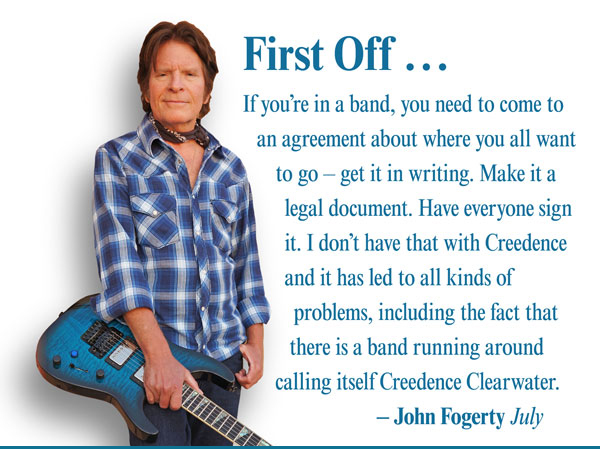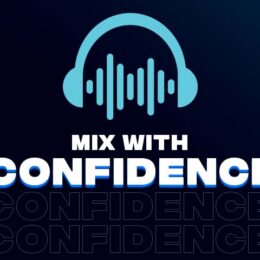 SONGWRITING
SONGWRITING
Don’t feel the need to emulate what someone else has done. The tide is changed by those who swim against it. – the Bullits, producer Aug.
You need to be true to your vision. Many times advisors (i.e. potential managers) have their own agenda that may or may not suit you. For example, we were asked to audition for America’s Got Talent by the show’s producer. We did one of our songs and they asked us to play “La Bamba.” It was such a clichО, it was sort of funny. – Vinyl Soul March
Rappers are writers. A rapper who contributes original material to your song is entitled to share equally in the ownership of that song with all other writers, unless you and he/she mutually agree otherwise and put that agreement into a signed writing. Also a person who supplies beats may claim an interest in the song resulting from use of those beats. This is still unsettled in law, but don’t take a chance and don’t use beats supplied to you without an agreement in writing as to how much of the copyright you are willing to give up to the creator of the beats. – Owen Sloane, music attorney Aug.
Don’t write off a song too quickly. Give it a chance to sink in. Oftentimes you’ll think that it should be developing a certain way. Take a step back and listen to it with fresh ears. – Phillip Lawrence, producer June
Work with up-and-coming artists. Find someone to be your Snoop Dogg or your Dr. Dre. Come up with them, and if they happen to blow, you’ll go right along with them. – Arch the Boss, producer Aug.
Artists need to do a lot of different things, not just expect to be the performer; they need to know all aspects. The only people I know who are making money are those who write and own their own songs. – David Lowery Sept.
Do things like you’re already in the position. All it took was one shot for someone to take me into a studio session because I was ready. And they looked at me like I was shiny and polished. – Eric Bellinger May
Once the song is finished, agree on the splits and commit that agreement to writing. A simple agreement listing the song title, the percentage of the song owned by each writer, i.e. “the splits,” dated and signed by each co-writer will suffice for each song. – Owen Sloane, music attorney Aug.
TOURING / BOOKING
Bands have to understand that they’ve got to be able to deliver [live]. Whatever you do in the studio you have to be able to duplicate on stage. People can tell. If a band isn’t good live, they’re never going to go see it again. – Butch Vig, producer Feb.
Try not to book yourself. It’s better to do it yourself than not do it at all, but find the right shows to be on. Align yourself with groups that are popular. If you’re from Seattle, don’t try to become popular in Boston yet. Focus on the region you live in and build your base from there. – Peter Schwartz, VP Agency Group March
If nobody showed up to see you play, the venue didn’t make any money off you. So asking them to pay a large guarantee can be like asking them to flush a case of JКger down the toilet. If they offer you half, with the explanation that they are losing money, it may be worth accepting it and chalking it up to bad luck. The alternative is to demand your full guarantee—and expect that they will never book you again. – David Barber, author Feb.
If you want a great chance to expose your music to a college campus, go play there! Aside from radio itself, our station is in charge of bringing music to our campus for live events. We organize at least three to four live shows per semester featuring all types of music from the surrounding community as well as touring acts. We are always looking for bands and musicians to come play in some form or another. The radio station also has a budget for promoting these shows via posters and flyers; so if you play here, people will know. – Ted Jamison, college DJ Oct.
Always have a contract with the venue. If you have any kind of agreement in writing and available to show the person who is paying you, a lot of time can be saved. A formal signed contract is not always needed, and many venue bookers won’t sign one anyway. However, an email that says, “Yes. We will pay you $300 for this gig,” or something to that effect from the venue’s booking person, will work. If you have a contract and the venue still refuses to pay, you may have grounds for a lawsuit. – David Barber, author Feb.
 If a fan asks me to play somewhere, I ask them to help me book a show. If they do that, I’ll give them a house concert. That has gotten me more bookings than just about anything else. – Marina V March
If a fan asks me to play somewhere, I ask them to help me book a show. If they do that, I’ll give them a house concert. That has gotten me more bookings than just about anything else. – Marina V March
Some venues have a policy where any band that doesn’t stick around to get paid at the end of the night, doesn’t get paid at all. Others will gladly let you pick it up the next day. Make sure you know what the policy is before you leave the premises. – David Barber, author Feb.
DEALING WITH THE SOUND GUY
Never ever ask the crowd, “How does it sound?” The sound guy will likely take that as an insult. The same is true for going out on the dance floor or seating area to listen. You are responsible for what comes out of your instrument, let the sound guy worry about the rest of the room.
Also, get your gear off/on the stage quickly. This is most important if there are bands scheduled to play after you. There’s only so much time allowed to get you off stage and the next band on. If you’re the headliner, there’s still a sound guy who has to pack up his equipment and clean off the stage before he can go home. Be nice to him. – David Barber, author Nov.
SINGING
Just as each voice has an audio persona, mics also have a “personality” by virtue of their design. Proper mic-to-voice matching avoids unwanted alteration of your voice. Problems can also occur if you’re singing through speakers that do not have a wide enough frequency range to properly reflect all the tonal qualities and nuances of your voice. You’ll understand this if you have ever tried to sing through a guitar or bass amp. Electronically designed to reproduce guitars—not voices—these amps will often dramatically alter the sound of your voice, causing you to subconsciously tighten your throat and push for notes. – Jeannie Deva, vocal coach July
HARMONIZING
You don’t have to be a great singer to be a good backup singer, but you do need to be able to create harmony parts and hold firm no matter which other vocal parts surround you. Make sure you know the melody well before you attempt to find harmony parts. Practice singing along to recordings with complex harmonies like Queen. Also, never let your voice stick out. There are several ways to accomplish this. First: begin and end each phrase exactly along with the other backup singers. Don’t come in early or leave late! Second: minimize the clarity of your consonants. Soften your final T’s or P’s or leave them off altogether. S’s are the most dangerous and can be almost eliminated. Watch your breathing sounds. Audible gasping can mar a good group sound, particularly during a quiet ballad. – Lisa Popeil, vocal coach May
PROMOTION / SUBMITTING MATERIAL
Never send more than four songs, because no one’s going to listen to more than that. If they like it, they’ll ask for more. You can’t hide a hit. – Neil Norman, President of Crescendo Records Oct.
We all know that you can buy numbers. So I look for indicators that tell me whether or not [those numbers are] accurate or suspicious. I want to see fan engagement at a high level, not just big numbers and little engagement. – Greg Federspiel, A&R, Warner Bros Jan.
[When dealing with labels], you have to be friendly. Don’t be antagonistic. We’ve been that way in the past, usually out of fear and insecurity. If they sign you, it’s for a reason. They’re on your side. – John Paul Pitts of Surfer Blood May
Artists should be honest with themselves and get professional opinions before they submit material to people like me. Don’t just ask your friends or family what they think. They’ll support you no matter what. – Peter Barker, Spin Move Records Jan.
Being responsive to the needs of music supervisors or editors requires not only knowing what to pitch to them, but also, how soon to pitch it. Most supervisors are working on tight deadlines, so whether it is responding to their budgetary needs or creative needs, the ability to communicate quickly and clearly goes a very long way.– Frank Liwall, Royalty Network Accountant June
You can’t go to a label and say, “Hey! I can sing!” They’d tell you to come back when you have a lot of fans. Labels don’t want to create a star. They want someone who has a million followers already. – De La Torre, Latin pop artist Nov.
TEACHING /EDUCATION
If you don’t overbook yourself, you deliver a high-end product. The hardest thing I run into with musicians is that we don’t value our time properly. We’re so used to having to hustle or justify why we get paid or not get paid at all, and we’re used to giving away our time. That might mean you have to charge a little higher rate. Let’s say you teach 20 lessons a week at $90 an hour. I believe you can make a living off that.
Also, teach kids. That doesn’t mean adults aren’t looking for lessons, they’re just terrible clients. Adults have very sporadic schedules, and you’ll get canceled on every week. – Tim Guille, music instructor May
It’s okay to admit you don’t know everything. Students respond favorably when you say, “I haven’t contemplated or experienced that. Say “Let me look that up” as opposed to pretending you know something when you don’t. – Loren Mulraine, law professor May
IN THE STUDIO
Artists Choosing the right studio
Usually, artists have three choices: their recording could be cheap, fast or good. If an artist can get two of the three, they’re good to go. The problem is that sometimes a cheap recording takes longer and usually involves an inexperienced producer. Whereas an experienced producer could get what you want quicker. – Warren Huart, producer July
Our college radio station has a brand new, built-in recording studio. Straight up. We will record you or your band and we will do it for cheaper than any “professional” studio. Our recording studio is one of the most important and shockingly underused resources in our radio program. On top of this, our recording studio has a connected bandcamp page on which we will promote whatever you record for free! – Ted Jamison, college DJ Oct.
Engineers Behind the Glass
In the back of the mind of every engineer I’ve met, they feel like they don’t really know what they’re doing. Everybody has this nagging doubt that they’re a fraud. You have to get comfortable with that feeling; that you’re not really in control. – Steve Albini, engineer March
It seems that everybody who graduates from an engineering school goes on either to teach or to start their own school. Rather than spending money on that, get some equipment and make some free demos. – James Dunkley, front of house engineer Sept.
The world is going in a different direction. You have to be involved in more of the creative process, whether that’s helping find or develop acts. Traditionally, that was the record label’s role. A producer that does artist development, marketing and even coaching helps grow their own career. – Matt Serletic, producer Jan.
There are too many producers trying to be artists. You have to let the artist shine. A producer needs to step out of the way and accompany an artist and put that artist on a pedestal. – Christian Davis, producer Feb.
Artists can be passive-aggressive, sometimes they’re blunt about what they like and don’t like. Other times you have to look for clues or signs to tell you that things aren’t working out. It’s about instinct; trusting your gut. You have to understand exactly how things are flowing and when you need to make a detour. – Butch Vig, producer Feb.
Using warm preamps and tube compression softens the transients, which makes the sound more warm and organic. The whole “fix it in the mix” philosophy is the worst thing you can do. It has to be good on the way in. – Jim Kaufman, producer Nov.
You can’t push the sound around. The more tweaking you do, the more freakish the music becomes. I learned the hard way that records end up sounding the best when you don’t have to do a lot to them. – Steve Albini, engineer March
You don’t always [get to] pick your projects—unless you have a trust fund. You don’t turn things down. If you only work on music that you love, you’ll go hungry a lot. – Reid Shippen, producer May
Try to understand the artist you’re working with. Don’t lose what’s unique about them. Don’t feel that you have to genericize or over-commercialize their music to have success. Bands that have a true identity are the ones that rise to the top. A lot of people are obsessed with trying to get a hit that could be on the radio. But these days with the Internet, a lot of the songs that I hear that are “hits” don’t sound anything like commercial music that we’d listen to 10 or 20 years ago. I say to artists, be true to yourself. – Butch Vig, producer Feb.
Just because you can have unlimited tracks doesn’t mean you have to use tons of tracks for a song. If the song really calls for many tracks and crossfades, okay, then go ahead. – Brian Tarquin Oct.
Work ethic trumps talent any day of the week. Point me to any high school and find the six or seven students most likely to succeed. I guarantee that the one that isn’t the best singer but has the best work ethic has a longer and better career than the best singer [with a lesser ethic]. – Jeremy Skaller, producer-songwriter July
SENDING MIXES / MASTERING
Sometimes someone has done a rough mix and squeezed it to within an inch of its life. They send it to me and say, ‘Do your thing; make it better.’ I instantly say, ‘The reason you don’t have clarity and can’t hear the kick drum is because you destroyed the record by over-limiting it.’ I can’t give dynamics and clarity when you want it to also sound like this distorted mess that looks like fresh-cut grass in the waveform. That’s a drag because oftentimes all they’d need to do is turn the volume up on my mix and they’d hear that it’s better. – Jason Goldstein, engineer Oct.
To be honest, bit formats are useless. If you re-cord something at 96 kHz, that’s a crappy mix––sample rates aren’t going to make it sound better. – Howie Weinberg, mastering engineer Oct.
Sometimes a band will want it as hot as the last Green Day record. But Green Day is a trio. You can get a sparse mix a lot louder than you can a mix with 10 layers of guitars and vocals. If you try to get your client’s mix that loud, it’ll implode. - Bob Vosgien, mastering engineer Oct.
After the Studio
As a signed artist I know how important promotions and marketing are. Sometimes they can create a buzz that spikes sales or bookings. So, I talk to my clients about that and try to help them formulate a post-recording plan. Their work isn’t done when they finish recording; it’s just beginning. In fact, 80 percent of the time new acts don’t make it to the next record. Artists should realize that if no one hears their record it doesn’t matter how great it is. – Billy Graziadei, producer July
Ultimately, music fans want to hear the magic of artistry. All the bells and whistles in the world won’t create that––the artist has to have “it,” and the producer has to capture it. – Michael Lloyd, producer July
AND REMEMBER…
You don’t need to sign the first deal that’s thrown in front of you. You don’t necessarily need a manager or a merch company. There is something to DIY and there is something to doing it on your own, because when you’re making great music good things should come to you. – Pete Wentz, Fall Out Boy May
Reach inside yourself, pull out the essence of you and people will be drawn to that. I learned early in my career that everybody’s just making it up as they go along, so go for it. Stay with the joy and love of it and stay out of the how. Don’t worry about the how. Just follow your joy. – Michele Clark, promoter June
Be clever and have a hit once in a while. Don’t get a big ego. Some people, when they make a little money or have a hit, go out and buy Rolls Royces and mansions. Then when it slows down, they lose it all. Even if you’re successful, you have to be sort of conservative because you never know that it’s going to continue and it usually doesn’t. – Neil Norman, Crescendo Records Oct.
You need to stop trying to act like you can read the consumer and manipulate people. Just make the music. Make it real, make it pure. People know. These kids aren’t stupid. I know people who don’t even listen to the radio anymore. They turn to the Internet to hear the music they want to hear and they stand by it. The only people who are subjected to the radio nowadays are kids getting picked up from school by their parents. – Kid Cudi Nov.
For many more great tips and expert career advice, visit http://www.musicconnection.com.












